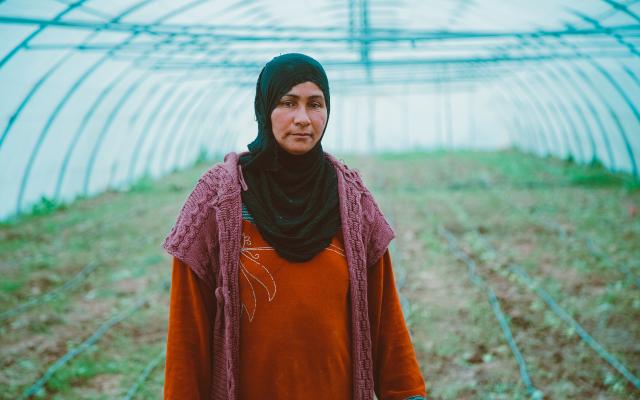
We know from countless examples across the world that during periods of conflict and crises, women and girls are more vulnerable than their male counterparts. In Iraq Oxfam has a number of initiatives that seek to promote gender justice and equality, through its programs, its policy and advocacy work as well as through its local partnerships. (Photo: Oxfam)
In Iraq, as elsewhere, the coronavirus pandemic is having severe impacts on the population, but women and men are affected in different ways and according to research conducted by Oxfam in Iraq, women are disproportionately affected when it comes to socio-economic impacts and access to essential support and/or services.
Women in three sample areas of the country are facing an increase in the burden of domestic work and caring responsibilities, a heightened risk of domestic violence and SGBV (sexual and gender-based violence) as well as loss of economic livelihoods and autonomy, which exacerbates existing vulnerabilities and inequalities already faced by women and girls in Iraq.
Women disproportionately and negatively affected
This is against the backdrop of existing inequalities and gendered discrimination faced by women across the country. Whether it’s a lack of socio-economic opportunities, under-representation in political and leadership roles or access to basic health care services, women continue to be disproportionately and negatively affected.
We know from countless examples across the world that during periods of conflict and crises, women and girls are more vulnerable than their male counterparts. At increased risk of SGBV, as well as limited movements that can prevent access to basic services as well as a lack of voice or representation in decision-making.
During the outbreak of the Ebola virus disease in West Africa in 2014–16, some service providers suspended their activities across the region. This restricted access to maternal health clinics, and led to maternal mortality rates increasing by 70%. A lack of family planning services also increases the risk of unplanned pregnancies, with impacts on maternal mortality.
According to global projections by the United Nations Population Fund (UNFPA), ‘47 million women in 114 low- and middle-income countries may not be able to access modern contraceptives and 7 million unintended pregnancies are expected to occur if the lockdown carries on for 6 months and there are major disruptions to health services’.
Here in Iraq, an already weak health infrastructure compounded by high levels of poverty and a volatile political and security context, we need serious policy and resource shifts to ensure even the most basic protections and opportunities for women. As Oxfam in Iraq we have a number of initiatives that seek to promote gender justice and equality, through our programs, our policy and advocacy work as well as through our local partnerships.

Fozia lives on a farm in Tikrit with her husband and eight children. After three years of displacement, and living as IDPs they were able to return to their home but it had been significantly damaged. Through an Oxfam grant, Fozia - along with other women - was able to build a greenhouse, where they were able to work together to start rebuilding their lives. (Photo: Oxfam)
Our partnership and gender team are working closely with Women’s Rights Organizations (WROs) across Iraq to support capacity development as part of Oxfam’s commitment to localization in Iraq. This work is complimented and harnessed by the policy and advocacy team in promoting WPS (women, peace and security) in Iraq by mobilizing local, national and international actors to support the second Iraqi National Action Plan (I-NAP).
While the I-NAP was off to a good start at in 2019, with a representative steering committee established by the Prime Ministers office and a first draft completed by autumn of 2019, the October protests and subsequent political fall out left the I-NAP on the sidelines of policy priorities for the time being. Despite the challenges of COVID-19, it is crucial that we continue to press for the finalization of the I-NAP and support the newly appointed Prime Minister and government in the implementation of this important strategy.
It is no surprise that the number of SGBV cases around the world have significantly increased during the current COVID-19 crisis; within the three governorates where the assessment was conducted, between 52% and 80% of the women reported that they felt there was an increased risk of violence during the pandemic. The GBV Sub-Cluster evidenced that 94% of the increased interventions of local actors protecting women were cases of “domestic violence reportedly perpetrated by a spouse or other family member/s within the household”.
As part of our protection programming, Oxfam in Iraq works local and international partners to address SGBV in Iraq. A lack of provision and/or access to basic services that can provide much needed support to women suffering from SGBV are massively under-funded in Iraq and require more investment both from the government as well as donors.
Gender justice at the heart of everything we do
Oxfam in Iraq has been at the forefront of the immediate emergency response to COVID-19: raising awareness, distributing hygiene kits, food baskets and providing cash assistance to the most vulnerable. As part of the longer-term recovery, it is essential that women play a full and active role in the response plan, ensuring full rights and protections for women.
My mother and grandmothers generations have lived through many waves of upheaval in Iraq and remain resolute in the resilience and fortitude of our local population, especially the women. I am proud to work for an organization where gender justice and equality are at the heart of everything we do and our work with local partners, civil society actors and government authorities can hopefully usher in a new change for not only Iraqi women and girls, but for society as a whole.
Download the research report “Gender analysis of the COVID-19 pandemic in Iraq”